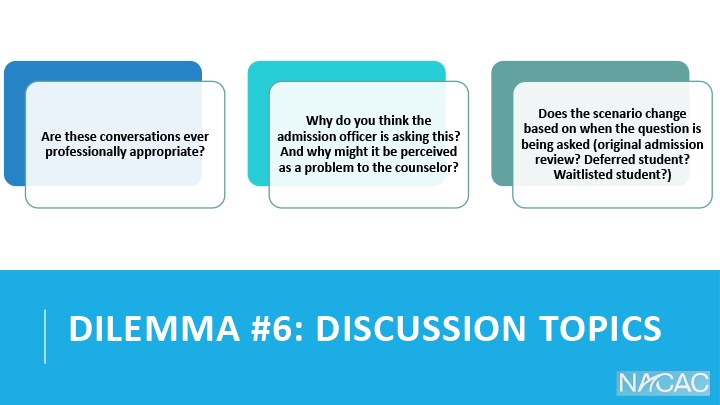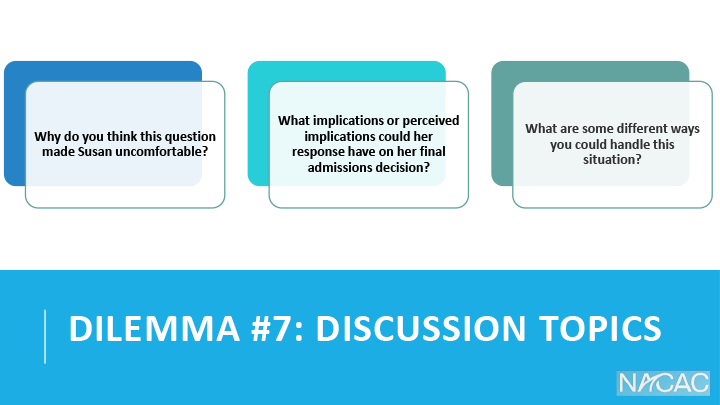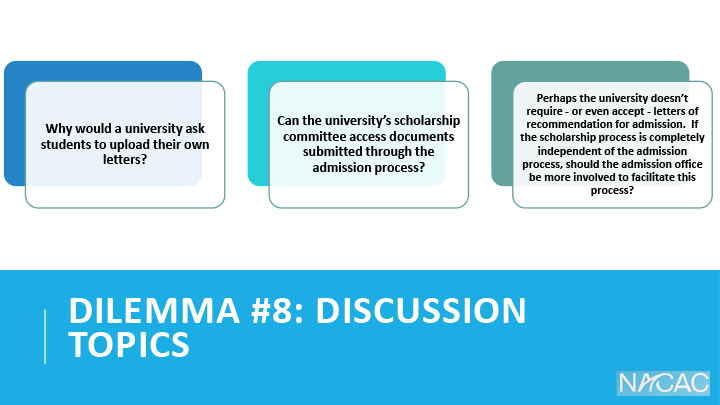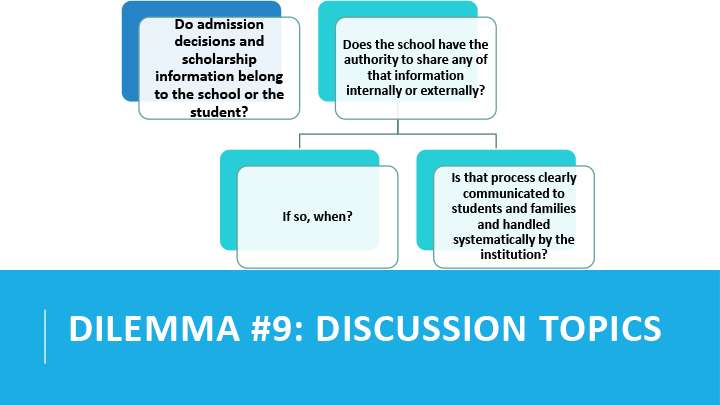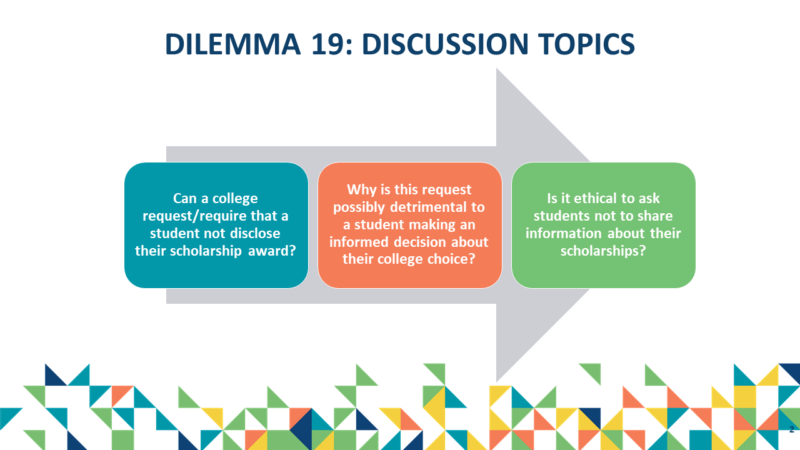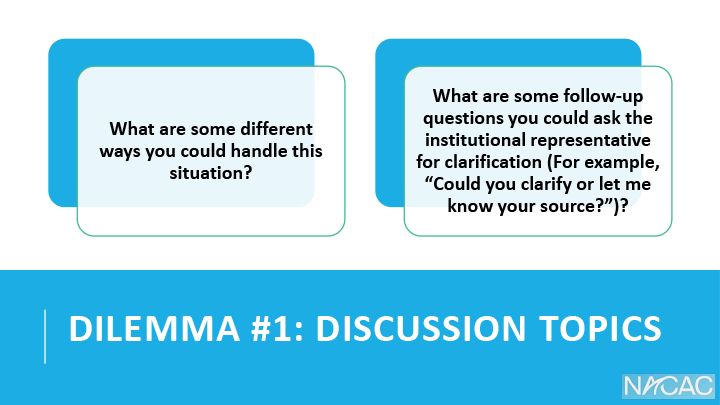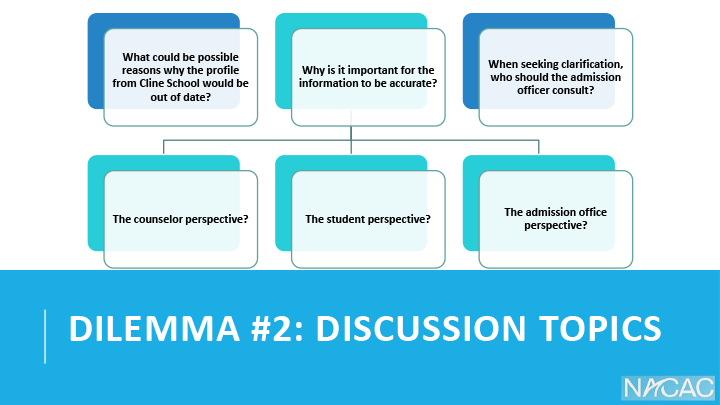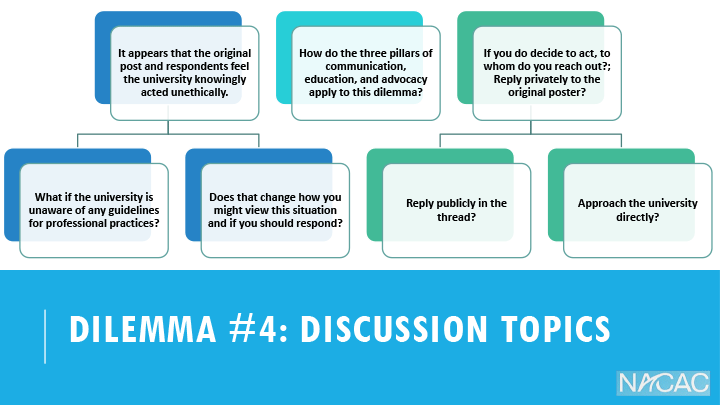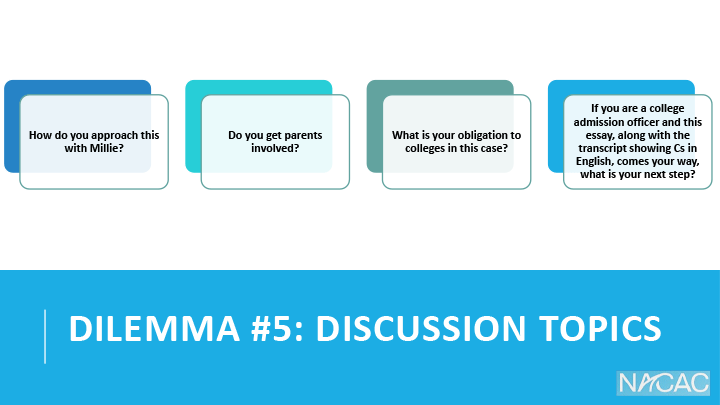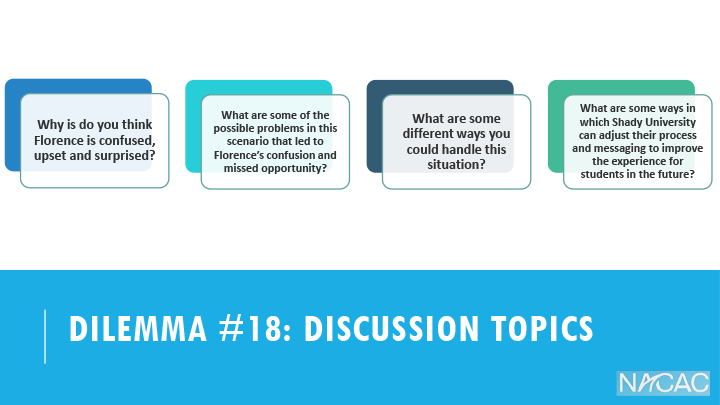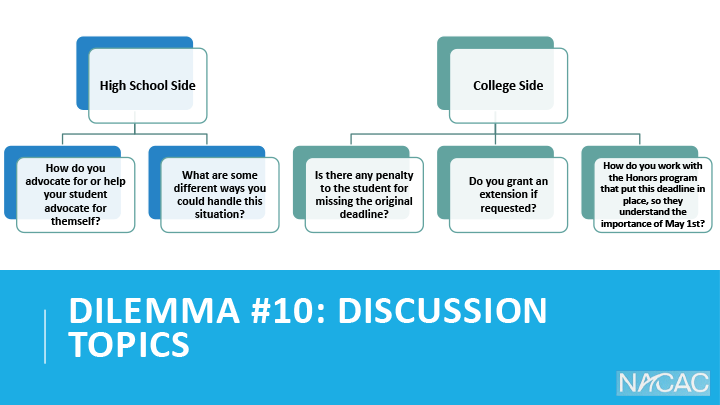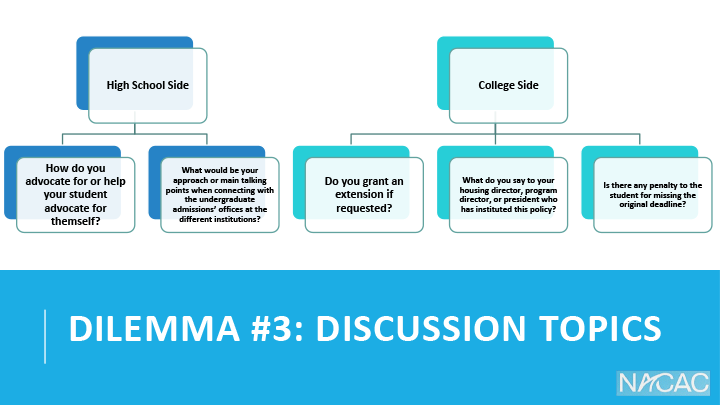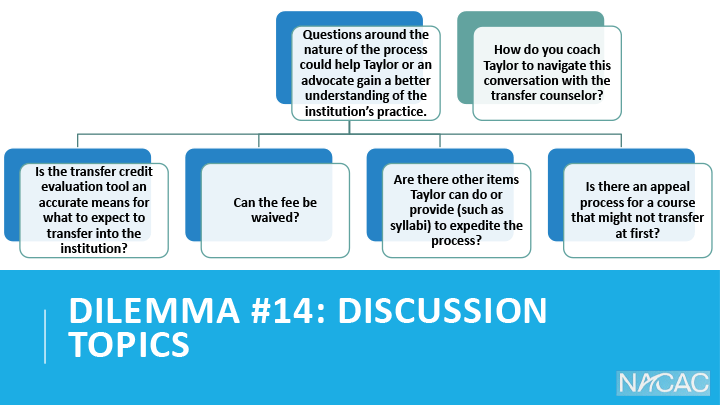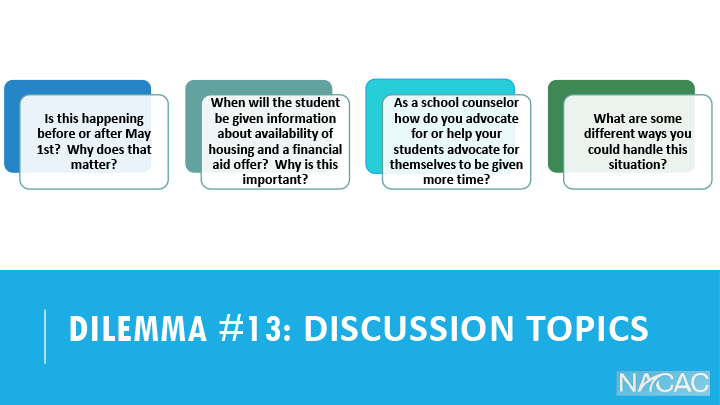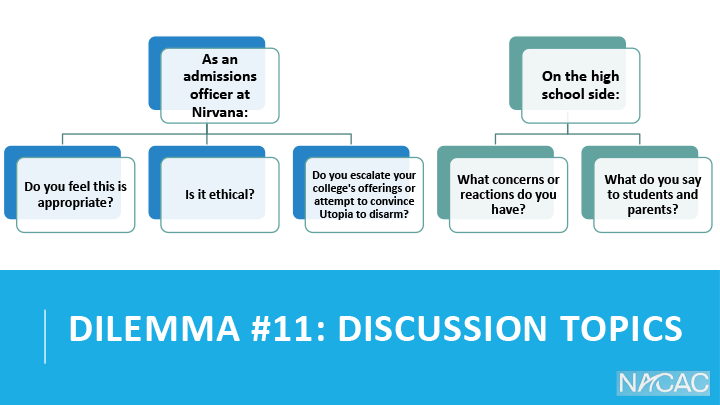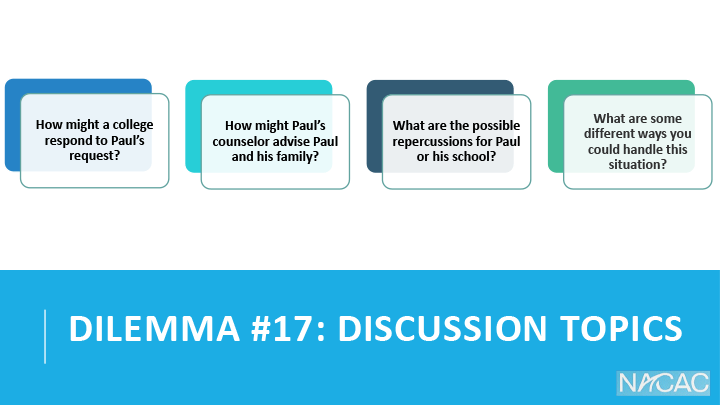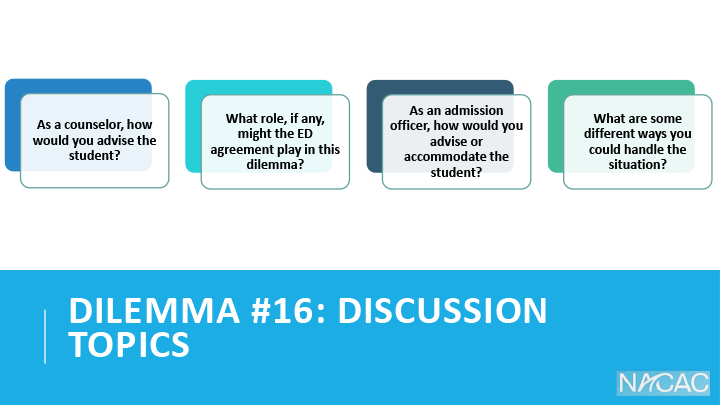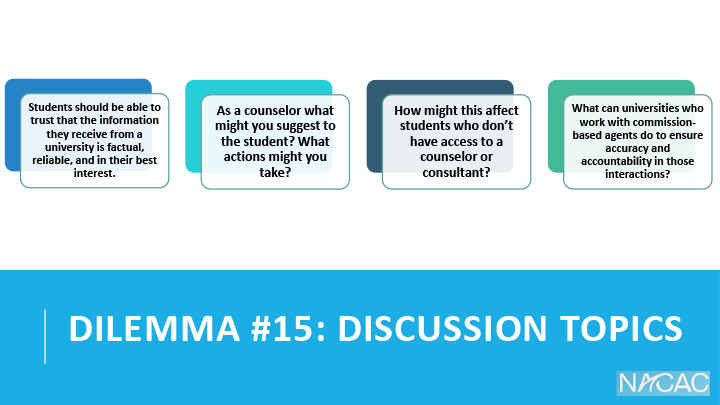Ethical Dilemmas in College Admission
In order to empower individuals to apply and advocate for ethical practice in college admission, NACAC created a series of dilemmas to use as educational tools. Presented with each dilemma are discussion topics, possible approaches, and a reference to the appropriate section in the Guide to Ethical Practices in College Admission.
Topics
Jump ahead to: Confidentiality | Truthfulness & Transparency | Admissions Dates/Deadlines | Early Decision | Commissioned Agent
Confidentiality
An admission representative from the University of Demonstrated Interest places a call to a counselor at Eagle High School to discuss an applicant. In the conversation, the admission rep asks if the counselor knows if UDI is at the top of her list or not, saying that “the kid is on the bubble, and it would be great to have this information.”
Susan has applied to X institution and in a conversation with an alumni interviewer, she was directly asked to divulge to what other institutions she has applied for admission. While Susan continued with the interview in order to fulfill the requirement for her admission to X institution, this question made her uncomfortable and uncertain for what this may mean for her admissibility to X based on the other schools she is considering.
The scholarship application for X University requires students to upload two teacher letters of recommendation and doesn’t offer an alternative method of submitting the documents to keep the letter of recommendation confidential. Unfortunately, in your high school’s handbook it prohibits giving students copies of their recommendation letters because that would violate the school’s confidentiality standards. You don’t want your student to miss out on a scholarship opportunity, but you also can’t violate your school’s policy. Your teachers write honest, thoughtful, and truthful letters because they can remain confidential.
During lunch, the Social Studies teacher says, “Oh, where did Elizabeth get accepted? I bet she applied to some big-name schools. How much scholarship money has she received?”
A parent reported that College Z offered their son a scholarship award and requested that the award offer not be discussed with any other colleges. The parent inquired as to whether this was a “best practice” and asked if this request (to not discuss scholarship offers) was ethical.
Truthfulness & Transparency
“Our institution has the second highest graduation rate in the state.” Upon a quick Google search, you realize the Admission Officer is incorrect. Their institution has the second highest graduation rate out of the public universities in the state, but out of all universities in the state they actually have the 7th highest graduation rate. They also didn’t give the students the exact graduation rate percentage.
Cline School provides colleges and universities each year with a school profile document, outlining courses offered annually, grading scales, and historic averages of its previous graduating class. It comes to the attention of an admissions office that data reported on these documents does not reflect the most updated information (submitting previous years’ data, only changing the date range in the header with no changes to reported information from previous year, and does not accurately portray grading scale details, etc.).
You see the following post on the College Admissions Counselors’ Facebook page: “I have a student who deposited at Atlantic Ocean University (AOU) prior to May 1st, got their welcome packet in the mail, secured off-campus housing, etc. In contacting the university during the second week of June about another issue, AOU informed the student that he was not enrolled for the fall. Apparently, they sent out a preference letter in an email to him, and the student thought he had already completed all his preferences, so he overlooked it. Nope! There is not a spot for him. He was told he can reapply next year. Is this an attempt to weed out the over enrolled population? Or is this normal protocol…” Replies to the post all put AOU on blast and pile on, relaying similar stories of ways people feel AOU has acted unethically.
As a counselor, you always ask students to read their essays so you can assist them (and it often helps you to get to know their story). Millie Van Nilly is a student who has been receiving Cs in their regular English classes since 9th grade. But when she brings you her essay, it is beautifully written. In fact, it doesn’t sound like Millie at all. It sounds professional.
Admissions Dates/Deadlines
After reading about Shady University’s early action program and receiving an invitation to apply as an early action, Florence submits an early action application for the nursing program. She submits her completed application by the December 1st early action deadline and awaits her early action decision, which is supposed to arrive no later than December 31st, according to the Early Action Program at Shady University. She receives a timely decision, but while it states that she is accepted to Shady University, it also states the nursing program is at capacity. She contacts the admissions office and is told that the Priority Deadline for the nursing program was November 1st, but she will be considered for a space if one becomes available. Florence is confused, upset and surprised.
John has been admitted to the Honors College at X University, an offer which is contingent upon his formal enrolling in the program and to the institution by March 15. While he is excited about this opportunity, he is also hopeful to receive offers of admission and scholarship to several other institutions, all of which have indicated he will have until May 1 to formally decide. John doesn’t want to miss out on the opportunity to attend the Honors College at X University, but he is feeling pressured to enroll without being able to consider all of his options.
Having been accepted to a nursing program, Flo Nightingale is told the housing deposit is due March 15. Flo wants to wait to hear from another nursing program that won’t notify until April 1. She approaches you as her counselor, wondering how to make the request for an extension of time for admissions’ consideration between the two programs.
Taylor has been admitted to Goal University and contacts the university’s transfer admissions department about next step after applying. Taylor worked hard at her current institution, and does wonder how coursework will transfer in, too. They inform Taylor that the university’s policy is that in order to produce a transfer credit evaluation and run a degree audit, the university must receive an enrollment deposit and will not produce a formal degree audit until that’s received. It does, however, send students a link to their online transfer credit equivalency database to review potential transfer credit. Taylor’s deposit is due in two weeks.
Coffey University accepts a student off of the waitlist. In the email informing the student of this decision, Coffey University states that the student has 24 hours to respond to the offer or it will be revoked.
Early Decision
Nirvana and Utopia, two similar universities, often compete for the same students. Utopia has started to offer perks for students who apply early: preferred housing, free books, daily morning lattes and afternoon ice cream.
Paul Privilege, an outstanding student from an affluent family, is delighted by his ED acceptance to his highly selective dream school. Before withdrawing applications to his other schools, as his counselor suggested, he hears from an EA college that he has been offered their Presidential Scholarship – a $35,000 per year merit award. His parents want him to accept that despite their signed ED agreement.
A student has applied ED to a U.S. university’s primary campus. The university has subsequently offered the student a space at its campus based in Europe instead of a space at its primary campus. The university is requiring confirmation and deposit by March 1st.
Commissioned Agent
A prospective international student was contacted by a commissioned agent representing a U.S. university. The student replies, stating his interest in the university, and they schedule a meeting. The student subsequently receives another email from the same individual but promoting a different university. When asked about the second email, and how many universities he represents, the agent explains that he primarily works for the first university and says nothing more. The meeting continues without further discussion of the second university.
